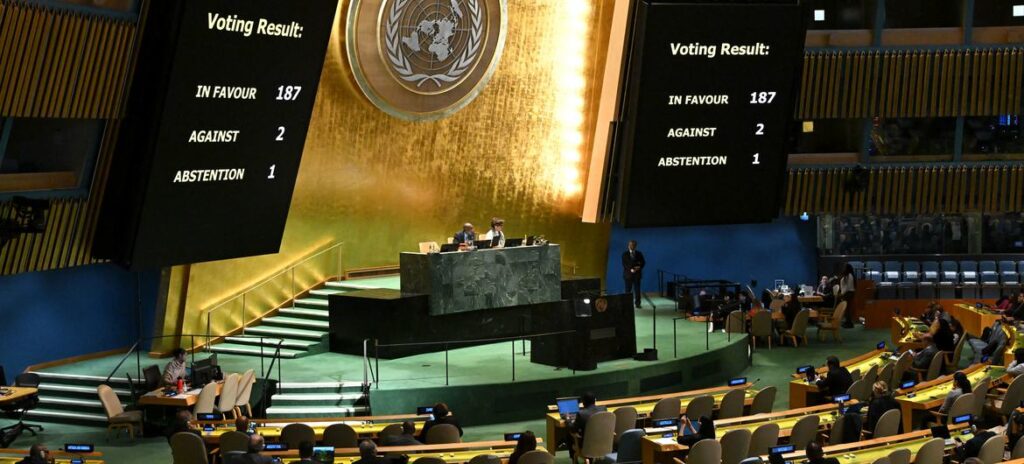UN General Assembly Renews Long-Standing Call for End to US Embargo against Cuba
LATIN AMERICA AND THE CARIBBEAN, 4 Nov 2024
Vibhu Mishra | UN News - TRANSCEND Media Service

UN General Assembly votes on the draft resolution on the necessity of ending the economic, commercial and financial embargo imposed by the United States against Cuba, 30 Oct 2024. UN Photo/Evan Schneider
30 Oct 2024 – The UNGA today once again urged the United States to end its economic, commercial, and financial embargo on Cuba, renewing a demand it has made annually since 1992.
The resolution, titled “Necessity of ending the economic, commercial and financial embargo imposed by the United States of America against Cuba,” passed with 187 votes in favor, two against (Israel and the US), and one abstention (Moldova).
Though non-binding, the result drew attention the relative isolation of the US regarding the embargo, which was first imposed in 1960 after former leader Fidel Castro came to power following the revolution.
The resolution reaffirmed, among other principles, the sovereign equality of States, non-intervention and non-interference in their internal affairs and freedom of international trade and navigation.
End punitive measures
The Assembly also reiterated its call for all States to refrain from promulgating or applying restrictive laws and measures, in line with their obligations under the UN Charter and international law, which, inter alia, reaffirm the freedom of trade and navigation.
“[The General Assembly,] once again urges States that have and continue to apply such laws and measures to take the steps necessary to repeal or invalidate them as soon as possible in accordance with their legal regime,” it said in the resolution.
The Assembly also recalled the measures adopted by US President Barack Obama in 2015 and 2016 to modify several aspects of the application of the embargo, “which contrast with the measures applied since 2017 to reinforce its implementation.”
Through the resolution, the General Assembly also decided to include the agenda item entitled “necessity of ending the economic, commercial and financial embargo imposed by the United States of America against Cuba,” in the provisional agenda of next year’s session.
Security Council transforms Somalia mission
Also on Wednesday, the Security Council decided to transform the UN Assistance Mission in Somalia (UNSOM) into the UN Transitional Assistance Mission in Somalia (UNTMIS) with the formal transition due to begin on Friday.
This sets in motion a transfer of UNSOM’s activities to the UN Country Team in Somalia over a two-year period, in line with a Government proposal.
Unanimously adopting resolution 2753 (2024), the Council further decided that the Transitional Mission should aim to complete the first phase of operation by 31 October next year.
The Council also expressed its intention to terminate the Mission’s mandate at the end of the anticipated transition by the end of October 2026.
Among transition priorities, the Security Council underscored support for State-building, including the constitutional review process and efforts to conduct free and fair elections.
It also highlighted the promotion and protection of human rights, rule of law, justice, corrections and security sector support, coordination of international donor support, working with bilateral and multilateral partners, and coordination of UN efforts in Somalia.
Extension for Colombia mission
In a separate action, the Council unanimously decided to extend the mandate of the UN Verification Mission in Colombia until 31 October 2025.
The Verification Mission was established in 2017 to oversee specific provisions of the 2016 peace agreement between the Government of Colombia and the former Revolutionary Armed Forces of Colombia-People’s Army (FARC-EP), which ended the 52-year long civil war in the country.
Tags: Anglo America, Blockade, Bullying, Cuba, Embargo, Hegemony, Imperialism, Latin America Caribbean, North America, Rogue states, State Terrorism, UNGA, USA, United Nations
DISCLAIMER: The statements, views and opinions expressed in pieces republished here are solely those of the authors and do not necessarily represent those of TMS. In accordance with title 17 U.S.C. section 107, this material is distributed without profit to those who have expressed a prior interest in receiving the included information for research and educational purposes. TMS has no affiliation whatsoever with the originator of this article nor is TMS endorsed or sponsored by the originator. “GO TO ORIGINAL” links are provided as a convenience to our readers and allow for verification of authenticity. However, as originating pages are often updated by their originating host sites, the versions posted may not match the versions our readers view when clicking the “GO TO ORIGINAL” links. This site contains copyrighted material the use of which has not always been specifically authorized by the copyright owner. We are making such material available in our efforts to advance understanding of environmental, political, human rights, economic, democracy, scientific, and social justice issues, etc. We believe this constitutes a ‘fair use’ of any such copyrighted material as provided for in section 107 of the US Copyright Law. In accordance with Title 17 U.S.C. Section 107, the material on this site is distributed without profit to those who have expressed a prior interest in receiving the included information for research and educational purposes. For more information go to: http://www.law.cornell.edu/uscode/17/107.shtml. If you wish to use copyrighted material from this site for purposes of your own that go beyond ‘fair use’, you must obtain permission from the copyright owner.
Join the discussion!
We welcome debate and dissent, but personal — ad hominem — attacks (on authors, other users or any individual), abuse and defamatory language will not be tolerated. Nor will we tolerate attempts to deliberately disrupt discussions. We aim to maintain an inviting space to focus on intelligent interactions and debates.
Read more
Click here to go to the current weekly digest or pick another article:
LATIN AMERICA AND THE CARIBBEAN: